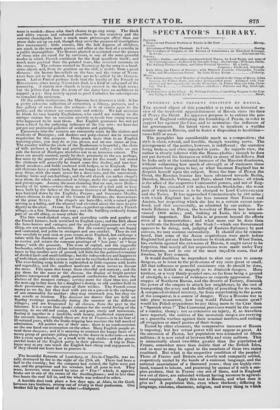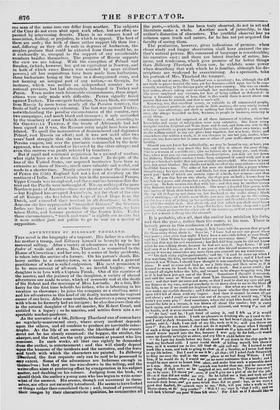PROGRESS AND PRESENT POSITION OF RUSSIA.
THE avowed object of this pamphlet is to take an historical re- view of the territorial aggrandizement of Russia since the time- of Pk:TER the Great. Its apparent purpose is to enforce the pro- priety of England cultivating the friendship of Persia, in order to support her against the Czar, and to neutralize the influence of his government. Its latent views are to inculcate a warlike animus against Russia, and to foster a disposition to hostilities- casusbelli or none.
The pamphlet has considerable merit as a composition; the style is clear, rotund, and forcible, though wanting nerve. The arrangenient of the matter, however, is indifferent ; the narrative being broken, and often repeated in parts. As regards view, the author is clearly infected with the Russo-phobia ; though he does not put forward his fantasies so wildly as many of his fellows. But he looks only at the territorial increase of the Russian dominions, without estimating how much of strength or of weakness these acquisitions have given to her, or what business England has to disquiet herself upon the subject. Since the time of PETER the Great, the Russian frontier has been advanced towards Berlin, Dresden, Munich, Vienna, and Paris, about 700 miles ; all which is the affair of the respective Continental powers, and not of Eng- land. It has extended 630 miles towards Stockholm ; the worst part of which increase is to be charged to Lord CASTLEREAGH and the Tories. It has approached Constantinople by 500 miles ; with which England has a far less interest than France and Austria, but respecting which she has to a certain extent inter- fered, and that successfully, as admitted by our author. To- wards Teheran in Persia, the boundary of Russia has been ad- vanced 1000 miles; and, looking at India, this is unques- tionably important. But India is at present beyond the effects even of a demonstration ; and what more can be dune than to cultivate the friendship of the Shah ?—which our Government appears to be doing, and, judging of Eastern diplomacy by past success, we may assume successfully. It should also be remem- bered, that some of the Asian acquisitions were made before England had got any Indian territory to think about. When Tories, too, exclaim against the extension of Russia, it ought never to be forgotten, that nearly all her acquisitions were made under Tory Governments, and in one of the most impol;tic cases, that of Sweden, by Tory consent.
It would doubtless be imprudent to shut our eyes to remote dangers, or to trust to the professions of any state great or small. All that influence or peaceful assistance can do should be done,. but it is as foolish to magnify as to diminish dangers. Mere territory, or a very thinly-peopled one, so far from being a ground of strength, is a source of weakness as respects aggression. The steppes of Southern Russia, and the deserts of Tartary, diminish the power of the empire to attack her neighbours, by the cost of transporting the army and the difficulty of providing Ibr its wants. A conquered civilized territory, far from contributing to the power of the conqueror, is a source of danger. Were a Russian war to take place to-morrow, how long would Poland remain quiet? would his Polish acquisitions be any thing more to the Czar than a "Spanish ulcer ?" The Caucasian provinces would be the source of a similar, thoug'i not so extensive an injury, if, as travellers have reported, the natives of the mountain ranges are carrying on a guerrilla warfare against their nominal masters, and cutting off stragglers or small parties of their troops. Tested by other elements, the comparative increase of Russia is imposing, but her actual power will not appear so great. At the accession of PETER, her population was estimated at fifteen. millions; it is now rated at between fifty and sixty millions. This is numerically about two-fifths greater than the population of France, somewhat more than double that of the British Isles,. and as near as may be equal to the numbers of these two states combined. But what is the respective condition of the peoples? Those of France and Britain are closely and compactly settled, respectively united by the bonds of a common language, and the national associations of a thousand years ; they are highly-civi- lized, trained to labour, and procuring by means of it such a sur- plus produce, that in France one out of three, and in England two out of three, are subsisted without having recourse to agricul- tural employment. Apply this test to Russia, and what does it give us ? A population thin, even when thickest; differing.rn language, customs, character, religion, and every thing in which
one man of the same race can differ from another. The subjects of the Czar do not even abut upon each other, but are often se-
parated by intervening deserts. There is no common bond of association, feeling, or prejudice, to which to appeal. The best of them are serfs ; the bulk of them rather support life than live ; and, differing as they all do only in degrees of barbarism, the surplus produce that could be extorted from them would be, as it confessedly is, unequal to the support of any considerable numbers besides themselves. The progress of Russia supports the view we are taking. With the exception of Poland and Sweden, (which, however, has got an equivalent in Norway, and in both of which cases Russia was assisted by more civilized powers,) all her acquisitions have been made from barbarians. those barbarians being at the time in a disorganized state, and not forming an integral part of any nation,—as Georgia, for instance, which was neither an independent country nor a national province, but had alternately belonged to Turkey and Persia: Even under such favourable circumstances, these acqui- sitions were only made with difficulty. PETER signally failed against Turkey. The energetic barbarian, NADIR Shah, recovered from Russia by mere terror nearly all the Persian territory, the fruits of half a century's scheming. The last war against Turkey, notwithstanding the peculiar circumstances of the country, cost two campaigns, and much blood and treasure ; it only succeeded by the treachery of some Turkish commanders ; and, according to Sir GRENVILLE TEMPLE, if the treaty of Adrianople had not been signed as it was, the Russian army might have been anni- hilated. To quell the insurrection of dismembered and disjointed Poland, cost Russia an effort; and it was not until after two years' hard struggle that she was able to triumph, not over the Persian empire; but over the provinces commanded by the heir- apparent, who was deserted or thwarted by the other satraps; and -even this success was partly achieved by treachery. But if rapid and continual acquisition be a ground of warfare, what right have we to throw the first stone ? In despite of the loss of the United States, our acquired territories have been as extensive as those of Russia, much more valuable and useful, and made in a shorter time. Nearly seventy years after the accession of PETER (in 1750 England had not a foot of territory on the continent of India. Lower Canada was in the possession of France, Upper Canada was unexplored, and the countries between that dis- trict and the Pacific were unthought of. We say nothing of the more Northern parts of America—these are about as valuable as Siberia —but England has occupied Australasia, not far short of the size of all Europe; she has taken the Cape of Good Hope from the Dutch, and extended their territory in all directions; in South America she has appropriated " unspoiled Guiana ;" the Western Indies ara hers ; and even within the present century, we have taken Malta, and become protector of the Ionian Isles. Under these circumstances, " watch and ware" is rightly our motto; but it were neither just nor politic to go to war on a matter of supposition.



























 Previous page
Previous page